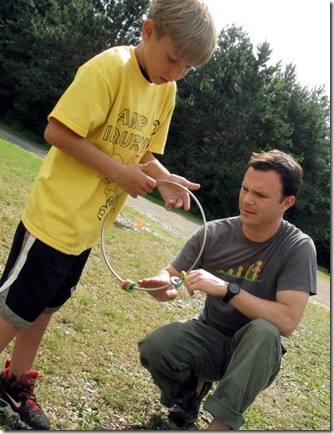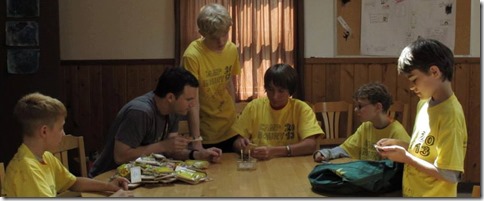- Photo by Monica Harmsen
Ability to get started on task/project quickly
- Teams waste a lot of time before the actual work gets done. Results in project teams can come in the initial phase when project teams have expertise in project management skills & people are eager to begin.
Ability to state what is working and how to improve
- Teams need an Understanding that problems DON’T equal solutions; Solutions = Solutions. Teams must quickly acknowledge that a problem exists then work to determine what will take the place of the problem, how the solution will function and work. Teams that can quickly create ‘what they want’ as opposed to ‘what they don’t want’ get work done and implement this process into the teams Skilled-Knowledge.
Recently I was reminded that we all get stuck in the explanation mode. Forgetting that progress towards meaningful goals is the driver of innovation and motivation.
At Camp Inquiry, working with children ages 7 – 17…My topic was Team Building with a dash of Deweyan Pragmatism & Critical Thinking ALL wrapped up in FUN!
While lecturing about Social Construct theory and the understanding of experiential learning to create a shared experience and language putting myself to sleep…I stopped and said
LET’S DO SOMETHING!
Why doing something is better than talking about something or nothing
You Cannot Motivate People
- They can motivate themselves. You can create an environment and system that is conducive to people being motivated. This system stems from completion of work and making progress on work that is meaningful. This only happens by defining the Goals; Roles; and Procedures then letting people get on with their work.
- Managers Rob Motivation by creating Motivation Schemes that insult our intelligence and work ethic, plus create greater unfairness within the workplace.
Once we get started we can evaluate what worked and what needs improvement
- The first step takes bravery and effort. If it happens fast and early within known goals and defined roles for the team members the initial fear is lessened and we can evaluate then create next steps.
- You cannot lead a Plan : Do : Check : Act process without the Doing the Plan.
Team Members can learn from progress and regress
- We know mistakes will happen. This is why taking small steps and reviewing what worked, what did not work – and how to change those steps in the future works.
- With a small step of doing something we can learn quicker and change faster.
Management can judge employee problem solving
- If people are involved in doing the work, as opposed to talking about it…we can accurately judge their work based upon the expected and achieved outputs.
- People who just sit in a room and talk about all the plans they have to get the work done and never get started are not doing any work. How can you properly evaluate someone who does nothing?
- Photo by Monica Harmsen
With the campers when involved in doing something we created the environment to talk about and challenge the ideas and concepts…all this happened while Spinning Rings, Balancing Mouse Traps, and walking in the woods.
I’ve made the same mistakes consulting and coaching Corporate Teams. Allowing myself and others to talk…and talk…and talk… then we are in a meeting 6 months later and NOTHING HAS GOTTEN DONE. People in the meeting are Zombies and management is angry because everyone has turned apathetic.
What do you think?
How do you get your team and work to do something? Is doing something better than doing nothing?



